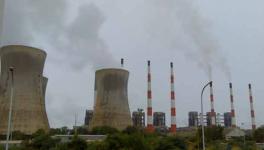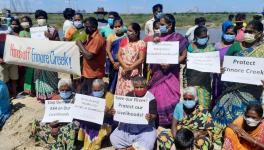TN: Pollution Control Board Fails to Monitor Emission from ‘Red Category’ Industries in Chennai
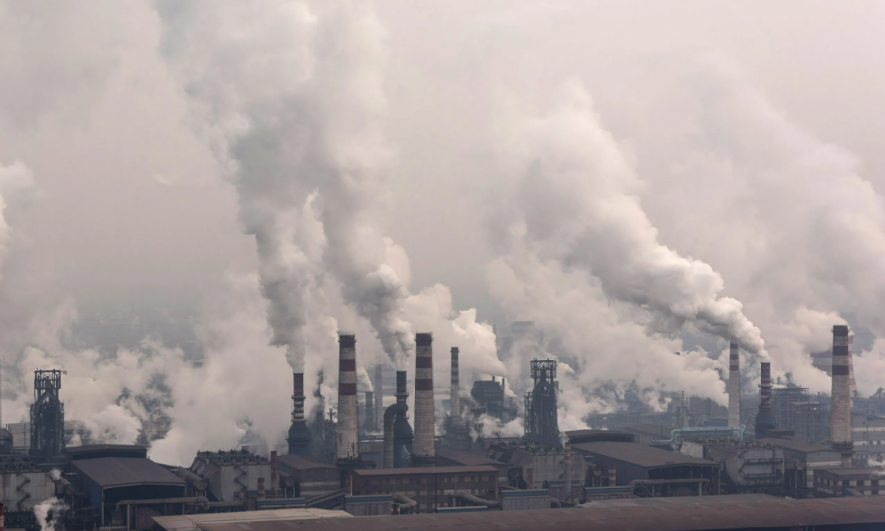
A study by the Chennai Climate Action Group (CCAG) has found that 6 industries in the Ennore-Manali region in Chennai violated emission norms for more than 50% of the time in 2020. The study arrived at the estimate on the basis of details obtained through a Right to Information (RTI) response for around 16 lakh hours of pollution monitoring data.
Two thermal power plants located in Ennore and four petroleum and petrochemical industries located in Manali were considered for the study. The CCAG had found that the same six industries were violating the emission norms for 59% of the time in 2019.
The CCAG has estimated the violation by comparing the stack emissions data with the threshold levels provided by the Tamil Nadu Pollution Control Board (TNPCB). The CCAG has accused the TNPCB of inaction when the industries continued to violate the norms of emission. The industries have also failed to monitor and/or report stack parameters, also considered a violation.
VIOLATION ESTIMATED AT 53% IN 2020
The pollution control boards of the states and UTs are mandated to ensure the installation of online Continuous Stack Emission Monitoring Systems (CSEMS) in 17 categories of highly polluting industries. The Centre for Accessing Real-Time Air (Quality) Information Report (CARE AIR) is supplied with this data for monitoring the emissions and violations.
Based on the data assessed, the thermal power stations, North Chennai Thermal Power Station (NCTPS) and NTPC Tamilnadu Energy Corporations Ltd (NTECL) were in violation of emission and monitoring norms for 50% and 45% of the year respectively, while the Chennai Petroleum Corporations Limited (CPCL) operated in violation of emission norms for 58% of the year.
The three petrochemical facilities, Madras Fertilizers Ltd (MFL), Manali Petrochemical Ltd (MPL) and Tamilnadu Petroproducts Ltd (TPL), were operating in violation for 67%, 7% and 41% of the time respectively in the period of study.
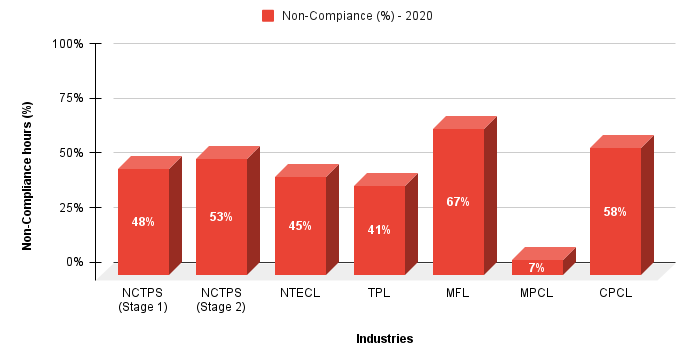
Courtesy: CCAG Report
The CCAG had conducted a similar study for 2019 as well, which had revealed the companies violated the air pollution and monitoring norms 59% of the time.
NON-COMPLIANCE AND NON-MONITORING OF DATA
Apart from violating emission norms, the industries have also failed to monitor the emission levels for several hours. “An industry is considered as non-compliant or in violation of emission and continuous monitoring norms if it fails to report data, reports flawed data or data in excess of emissions thresholds prescribed by the TNPCB’, the CCAG report mentioned.
Stage 1 and 2 of the NCTPS, run by the Tamil Nadu Generation and Distribution Corporation (TANGEDCO) limited also has no data on emission for several hours under study. The two stages have reported emission of nitrous oxides (NOx), Sulphur dioxide (SO₂) and particulate material (PM).
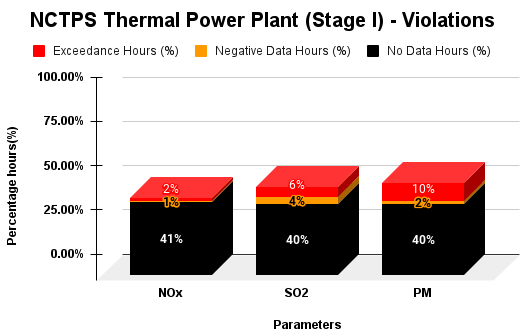
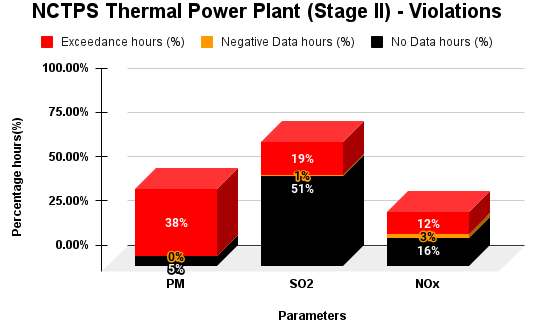
Courtesy: CCAG report (negative data hours represent the duration for which the quantity of emission was given as negative in RTI response and no data represents the non-availability of emission)
The NTECL monitors and reports PM, SO₂ and NOx levels to TNPCB's Care Air Centre. The report found that the non-compliance for the three parameters stood at 27%, 60% and 47% respectively. The three units of the NTCEL were non-compliant for 41%, 35% and 58% respectively.
Data pertaining to three refineries of the CPCL were analysed by the CCAG. Refineries 1 & 2 failed to monitor/report data for 42 out of 70 stack parameters, while the third failed to monitor toxic Hydrocarbon emissions for 99% of the year.
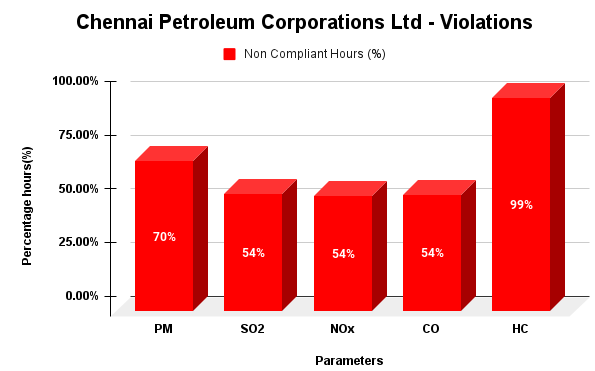
Courtesy: CCAG report
Ammonia, Hydrogen Fluoride (HF) and PM are the three parameters MFL monitored and reported to the TNPCB, but had no data on emissions for the larger duration of the year.
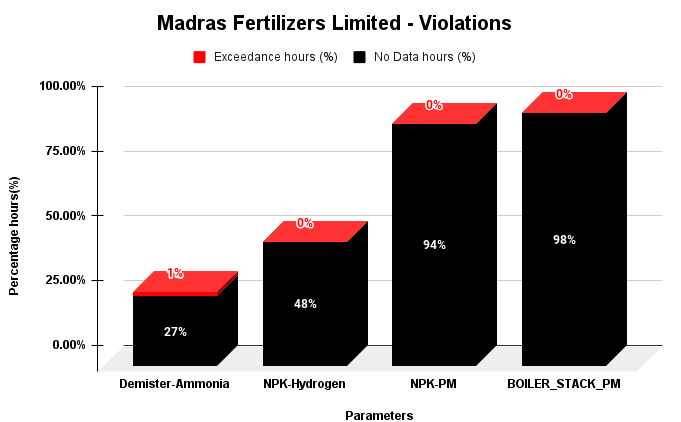
Courtesy: CCAG report
The two plants of MPL monitored and reported suspended particulate material (SPM), SO₂, NOx and carbon monoxide (CO) levels. The SPM emissions in plant 1 were not monitored for 11% of the time while the CO emissions from plant 2 were not monitored for 13% of the time.
The TPL monitored and reported PM, SO₂, NOx and CO levels, and the report found the plant to be non-compliant for 39% of the year.
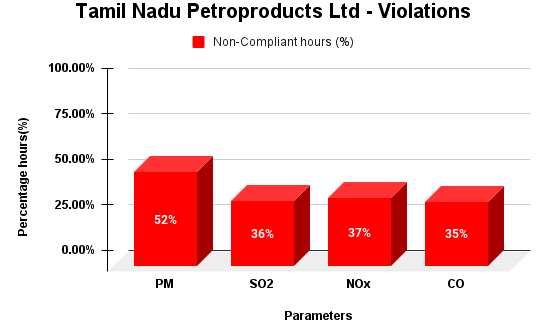
Courtesy: CCAG report
‘TNPCB MUST ACT AND REGULATE’
The role of the TNPCB, the monitoring and regulatory body, has been criticised for inaction on the blatant violation of emission norms by the industries.
Vishvaja S, an environmental health researcher who carried out the survey, alleged that the TNPCB has failed to fulfil its duties on incidents of emission norms violation. “The PCB has a very vital role to play and it has to monitor and regulate such practices. But, unfortunately, the TNPCB is not doing both”, she said.
The CCAG has demanded action against the TNPCB officials accountable for their failure in implementing the environmental laws. “A time-bound action plan to make the TNPCB and Greater Chennai Corporation (GCC) effective law enforcers and a time-bound action plan to make industries compliant is necessary”, the CCAG report said.
“To regulate the industries, the TNPCB must monitor for violations. The licenses must be provided based on the history of the industries”, Vishvaja said.
The report also demanded action from respective health officials to exercise their responsibilities under the TN Public Health Act to ensure that public health is not affected by the illegal operation of industrial units in the region.
Get the latest reports & analysis with people's perspective on Protests, movements & deep analytical videos, discussions of the current affairs in your Telegram app. Subscribe to NewsClick's Telegram channel & get Real-Time updates on stories, as they get published on our website.









